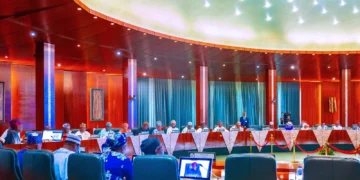As long as insecurity pervades the land, so long will the discourse to find means of ending it never ends. On Thursday, the Nigeria Union of Journalists (NUJ) and the ‘New National Star’ newspapers staged a one-day summit in Abuja, tagged the ‘National Security Conference 2024’, where critical stakeholders were invited to discuss what best means to end the blight of insecurity ripping across the country. The thematic focus of the conference, among others, included strengthening citizens’ engagement in the fight against crimes; roles of leadership in finding solutions to the menace of insecurity; intelligence gathering and information sharing in improving national security and the role of the media in combating insecurity, among others.
Various perspectives
Speaking on strengthening citizenship engagement in the fight against crimes and criminalities, the chairman of the Police Service Commission (PSC) and former Inspector General of Police (IGP), Dr Solomon Arase, reiterated the need for citizens’ engagement in the fight against insecurity militating against the Nigerian state. Describing security as not only the business of security forces, the former nation’s police boss called for mass participation of citizens in retrieving the nation from the jaws of criminals unleashing their venom on Nigerians.
For Ambassador Godknows Igali, who spoke on roles of leadership across the spectrum of the Nigerian society, the need to reflect on the past and the virtues of past leaders should form the fulcrum of new attempts to vitiate the monsters of insecurity. He reminded the audience that it is only through peaceful co-existence that could bring about national development. And for that to take place, Ambassador Igali said that leadership, both at national and sub-national levels, must turn a new leaf and be dedicated to the interest of the nation.
The former director of the Director of State Services (DSS), Chief Ray Nkemdirim, provided a glimpse into the past, especially during the October 1 bombing that once rocked the nation’s capital in 2010. He recalled the distressing experiences suffered by the security forces, especially the DSS, in arresting the bombers before the incident. He recalled that the doggedness of the security organisation in the coming years would eventually pave the way for collaboration between communication giants in charge of mobile phone with security for information sharing
Yours sincerely, who spoke on the role of the Media In fighting insecurity in Nigeria, called for synergy between security forces and the media. It is obvious that since the security outfits are meant to curtail information, there was bound to be some kind of suspicion between the media and security agencies. The synergy of military media relations has been mutually cordial, though sometimes mutually suspicious. In August 2014, reporters of the ‘Daily Trust’ in Maiduguri, Borno State, Jamilu Aliyu and Aminu Ado, were arrested in August 2014 for reporting a story on alleged refusal by troops to fight Boko Haram, except better weapons were procured for them. The military authorities had earlier in June 2014 disrupted deliveries of newspapers alleged to be carrying out stories described as not in line with national interest. Some of the newspapers that suffered seizure included ‘LEADERSHIP, The Nation, The Punch and Daily Trust’, among others.
Still on calamitous path
According to Eons Intelligence Outfit based in Nigeria, 79,373 lives were destroyed due to insecurity from June 2011 to June 2021, as shown below, according to geo-political zones: 3, 534 (south-west); 5, 710 (South-south); 3,020 (South-east); 10, 119 (North-central); 44, 247 (North-east) and 12, 743 (North-west). These deaths recorded within a space of 10 years must be troubling, taking into cognisance that Nigeria is not at war with any foreign nation.
The December 2023 slaughter in Mangu, Plateau State, and recurring killings of defenseless citizens is reflective of the frightened and galloping insecurity wrecking the country. Abduction and ransom payment are daily recurring phenomena. Daily reports on the destruction of that has led to the killing of 2,976 teachers in the North-east geo-political zone and destruction of over 910 primary and secondary schools in Borno State only.
Over seven months after the inauguration of the present administration, the spate of insecurity has not shown any sign of decrease in the future. What that means is that the coming days are embroiled in frightening uncertainties. If we ever want to combat insecurity and change the narrative, the need for a paradigm shift in the manner the country confronts insecurity is imperative.
What to do now
As the president of the NUJ, Comrade Chris Isiguzo, said, the need to open up the space and encourage collaboration among critical stakeholders against insecurity has become very necessary. Isiguzo’s assertion is solidly supported by the Managing Director/ Editor-in-Chief of the ‘New National Star’, Dr. Obinna Nwachukwu, who declared that only a collective action against perpetrators of insecurity can end the current scourge unleashed on Nigeria. The presence of stakeholders, including top security officers is reflective of the commitment by the organisers of the summit to chart a new path in tackling security challenges shredding the country.
Much as the military should be less in words, but more in action, the media must hold the security forces to account for whopping sums of funds, amounting to tens of trillions of naira allocated to the defence sector in the last decade in the fight against insecurity. Salvaging citizens from the jaws of non-state actors that are engaged in violent attacks against the Nigerian state is never an easy task; it requires fool-proof planning in both kinetic and non-kinetic strategies and supported by all to stamp out the monsters of insecurity.





